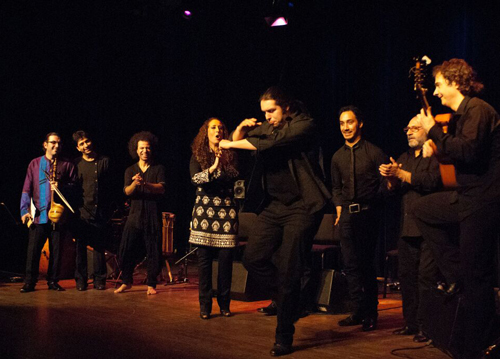by Mike Telin

Created for the third Dutch Flamenco Biennale by festival Artistic Director Ernestina van de Noort (click here to view a promotional video), Qasida was described by writer Jan Fairley as a “contrast between the sheer beauty of flamenco’s distilled, passionate outpourings of the heart and the more inward, mystical philosophies of Persian poetry…” Following the Cleveland performances the show will travel to New York, Washington, D.C., and Boston.
Born in Tehran, Iran in 1978, Mohammed Motamedi started singing and playing ney (a traditional flute) as a youngster. In 1997 he began studying the singing style of Seyed Hossein Taherzadeh under the guidance of Hamidreza Noorbakhsh. Because of his interest in the Esfahan song school, Motamedi has taken as his role models such masters as Taj Esfahani and Adib Khansari. Motamedi has performed with several groups, including the Khorshid Ensemble, Sun Ensemble, the Iranian National Orchestra, and the Mehr Symphony, which he founded. In 2013 he was awarded the France Musique World Music Prize.
Born to a family steeped in flamenco tradition, Rosario La Tremendita also enjoys celebrated careers as a writer and artist. As a student she conducted her own research on flamenco singing in addition to studying music theory and piano. In 2008, following six years of collaborating with dance companies, she decided to pursue a solo career as a singer and composer.
Where did flamenco come from? Although there are many theories, none can be substantiated. In his 1933 book Orígenes de lo Flamenco y Secreto del Cante Jondo, Andalusian historian Blas Infante suggests that the word’s origins can be traced to the Hispano-Arabic term fellah mengu, “expelled peasant,” referring to the Moriscos, ethnic Andalusians of the Islamic faith.
Rosario La Tremendita graciously agreed to answer questions through a translator via email.
How did you first become interested in flamenco singing?
My father, José El Tremendo, is a famous flamenco singer, so from an early age I heard the singing and saw the dancing at the clubs where he performed. When I was very young he gave me a guitar and every day he would spend time teaching me flamenco songs. I gave my first public performance at the age of five.
Why was it important for you to research the origins of flamenco singing?
I am passionate about flamenco, and love the ‘cante jondo’ (deep song). I knew the style was steeped in tradition and I wanted to know more. I also knew that if I wanted to continue to advance that style I would need to have an understanding of its history.
I understand that when Ernestina van de Noort was developing the Qasida project she sent you sound files of a few Iranian singers, and Mohammad Motamedi was at the top of your list. What attracted you to his voice?
Mohammad Motamedi is a virtuoso and sings with incredible soul in his voice. He’s also an extraordinary human being with a deep connection between his mind, his heart, and his instrument. The first time I heard him I was deeply touched, as I continue to be every time I hear him sing.
How does Mohammad inspire you as a performer?
His way of singing is like a prayer. When we’re performing I feel that his singing is going to a level that is beyond the music itself.
Have you composed any songs based on Persian poetry?
When we were creating the Qasida project I spent many hours reading Persian poetry, for example the poetry of Hafez Shirazi, and I completely fell in love with it. For me it shares many similarities with the popular poetry that is present in flamenco. I found it to be a familiar form, something that I already knew. Because of that familiarity, writing music for this project happened in a very natural way.
Has being part of the Qasida project changed you as a performer or as a person in any way?
Whenever you are part of a project like Qasida the experience always changes and enriches you. At every concert, to be close to Mohammad and to all the musicians brings about new emotions and new feelings inside of me.
Published on ClevelandClassical.com March 14, 2016.
Click here for a printable copy of this article



